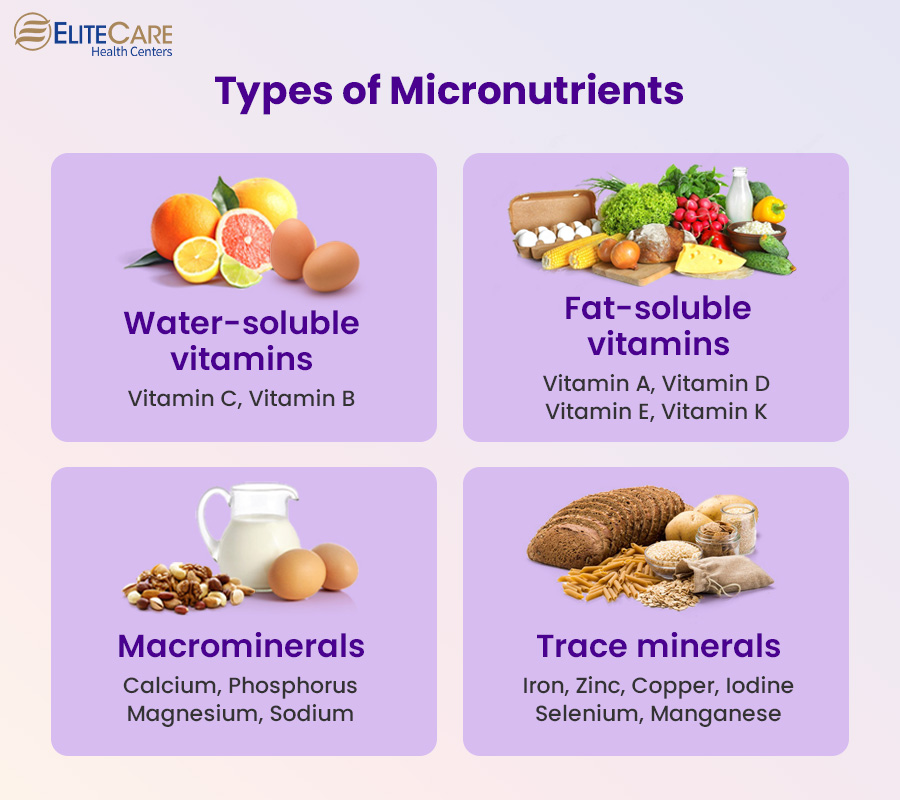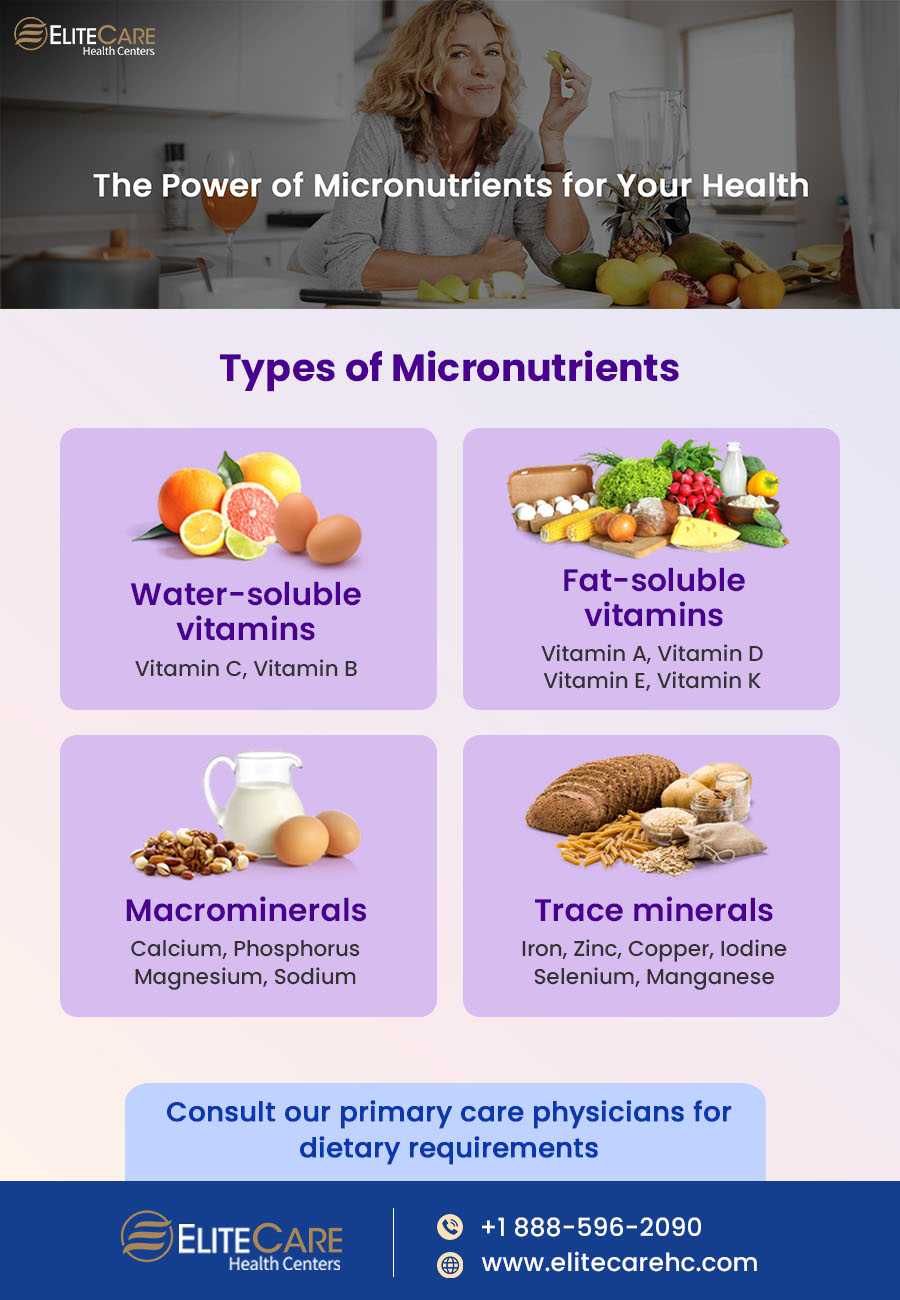
Micronutrients play a crucial role in maintaining optimal health and well-being. While most of us focus on macronutrients, such as proteins, carbohydrates, and fats, we often overlook or underestimate the importance of micronutrients. These essential nutrients help our bodies to function optimally.
So, what are micronutrients? In this blog post, we will share a comprehensive understanding of micronutrients, including their significance, sources, and required dietary allowance. Read on for more.
What Are Micronutrients?
The term ‘micronutrients’ is a broad category of nutrients referring to vitamins and minerals. Humans require these essential nutrients in smaller quantities compared to macronutrients. Vitamins are organic compounds produced by plants and animals, which can degrade due to heat, acidity, or exposure to air. On the other hand, minerals are inorganic substances resistant to breakdown and found in soil and water.
Individuals must obtain micronutrients from food sources because our bodies cannot produce them for most parts. The micronutrient composition varies in each food item. Therefore, individuals should incorporate a diverse range of foods into their diet to ensure an adequate supply of vitamins and minerals.

Micronutrients versus Macronutrients
Micronutrients and macronutrients are two fundamental categories of nutrients that our bodies require to function optimally. They differ significantly in terms of quantity, health benefits, and how our bodies metabolize them.
While we need micronutrients in trace amounts, usually measured in milligrams or micrograms, we need macronutrients, namely carbohydrates, proteins, and fats in larger quantities.
Macronutrients provide calories and work as our body’s primary source of energy. They also play a vital role in building the structural components of the body. On the other hand, micronutrients regulate specific biochemical processes to ensure optimal health.
A balanced diet includes both macronutrients and micronutrients to maintain overall health and well-being.
Types and Benefits of Micronutrients

1. Water-soluble vitamins
These vitamins easily dissolve in water, and the human body cannot store them for extended periods. We need to consume water-soluble vitamins regularly since these vitamins easily get excreted through urine.
a. Vitamin C (ascorbic acid)
It is an antioxidant that supports the immune system, collagen synthesis, and wound healing.
- Food sources: citrus fruits (oranges, lemons), strawberries, bell peppers, broccoli, etc.
- RDI: 75 to 120 mg
b. Vitamin b
This group of vitamins plays crucial roles in energy metabolism, brain function, and cell production.
- Food sources: whole grains, legumes, meat, dairy products, leafy greens, eggs.
- RDI
- Vitamin B1 (thiamin): 1.1 to 1.4 mg
- Vitamin B2 (riboflavin): 1.1 to 1.6 mg
- Vitamin B3 (niacin): 14 to 18 mg
- Vitamin B5 (pantothenic acid): 5 to 7 mg
- Vitamin B6 (pyridoxine): 1.3 to 2.0 mg
- Vitamin B7 (biotin): 30 to 35 mcg
- Vitamin B9 (folate): 400 to 600 mcg
- Vitamin B12 (cobalamin): 2.4 to 2.8 mcg
2. Fat-soluble vitamins
These vitamins dissolve in fat, and the body can store these in the fatty tissues for longer periods
a. Vitamin a
It is essential for vision, immune function, and cell growth.
- Food sources: carrots, sweet potatoes, leafy greens like spinach, kale, etc., animal liver.
- RDI: 700 to 1,300 mcg
b. Vitamin d
This fat-soluble vitamin supports bone health, immune function, and overall well-being.
- Food sources: fatty fish such as salmon, mackerel, fortified dairy products, etc., And sunlight.
- RDI: 15 to 20 mcg
c. Vitamin e
This vitamin is an antioxidant that protects cells from damage and supports immune function.
- Food sources: nuts, seeds, vegetable oils, spinach, broccoli, etc.
- RDI: 15 to 19 mg
d. Vitamin k
It is crucial for blood clotting and bone health.
- Food sources: broccoli, brussels sprouts, and leafy greens such as kale, spinach, etc.
- RDI: 90 to 120 mcg
3. Macrominerals
These are minerals that the body requires in larger amounts to regulate several bodily functions.
a. Calcium
This essential mineral helps maintain bone health, muscle function, and nerve transmission.
- Food sources: dairy products, leafy greens, fortified foods, etc.
- RDI: 1,000 to 1,200 mg
b. Phosphorus
It supports bone health and plays a vital role in energy production and cell function.
- Food sources: meat, dairy, nuts, seeds, whole grains, etc.
- RDI: 700 mg
c. Magnesium
This macromineral helps maintain optimal muscle and nerve function and energy production and strengthens bone health.
- Food sources: nuts, seeds, whole grains, leafy greens, legumes, etc.
- RDI: 310 to 420 mg
d. Sodium
This essential mineral is required for fluid balance, nerve function, and muscle contractions.
- Food sources: table salt, processed, salt-cured foods, canned soups, etc.
- RDI: 2,300 mg
4. Trace minerals
The human body requires these micronutrients in very small amounts. However, they are still crucial for various physiological functions.
a. Iron
This trace mineral is essential for oxygen transport and energy production.
- Food sources: red meat, poultry, beans, fortified cereals, etc.
- RDI: 8 to 27 mg
b. Zinc
This micronutrient supports immune function, aids wound healing, and regulates enzyme activity.
- Food sources: meat, seafood, nuts, seeds, dairy products, etc.
- RDI: 8 to 12 mg
c. Copper
Copper plays a crucial role in iron metabolism, connective tissue formation, and antioxidant function.
- Food sources: organ meats, seafood, nuts, seeds, whole grains, etc.
- RDI: 900 to 1,300 mcg
d. Selenium
This mineral acts as an antioxidant and supports thyroid function and the immune system.
- Food sources: brazil nuts, seafood, meat, whole grains, etc.
- RDI: 55 to 70 mcg
e. Iodine
It is essential for the production of thyroid hormones that regulate metabolism, energy production, and overall growth and development.
- Food sources: iodized salt, seafood such as cod, tuna, shrimp, scallops, seaweed, dairy products, eggs, etc.
- RDI: 150 to 290 mcg
f. Manganese
This trace mineral acts as a cofactor for various enzymes involved in metabolism, bone development, and the formation of connective tissues.
- Food sources: nuts such as almonds, pecans, and hazelnuts, whole grains, legumes, black and green tea, spinach, kale, etc.
- RDI: 1.8 to 2.6 mg
Each micronutrient has a distinct role in promoting proper growth and optimal bodily function. The daily requirements can change based on individual health, weight, age, etc. Therefore, individuals should consult a primary care physician or a registered dietitian to determine the appropriate intake of these micronutrients.
Micronutrient Deficiency
There are certain micronutrient deficiencies prevalent worldwide, notably within developing nations. According to data from the Centers for Disease Control and Prevention (CDC), the following are six commonly observed global micronutrient deficiencies:
- Iron deficiency can cause fatigue, pallor, cold extremities, and sensations of dizziness or faintness.
- Vitamin A deficiency can result in nighttime blindness, dryness of the eyes, lack of resistance to infections, impaired vision, and inhibited growth.
- Vitamin D deficiency can cause muscle discomfort or spasms, extreme weakness, bone pain, fatigue, and frequent mood alterations.
- Zinc deficiency can lead to diarrhea, alopecia (hair loss), delayed growth, frequent or recurring infections, loss of appetite, reproductive issues, and reduced sense of taste and smell.
- Iodine deficiency can result in enlarged neck protrusion or goiter, unusual pressure in the neck area, swallowing difficulties, cognitive impairments, growth hindrances, sensations of coldness, fatigue, memory lapses, and constipation.
- Folate deficiency can cause weakness, fatigue, difficulty concentrating, irritability, headaches, palpitations, shortness of breath, etc.
The Bottom Line
Individuals should prioritize a balanced diet that includes a wide variety of nutrient-rich foods to ensure sufficient intake of these essential micronutrients. While supplements may be necessary in some cases, they are not a substitute for a healthy and diverse diet. Consult a primary care physician or registered dietitian to get personalized guidance on diet and micronutrient intake.
For any queries or concerns about dietary alterations or nutrient deficiencies, consult the board-certified primary care physicians at EliteCare Health Centers. We are a medical clinic in Florida that offers a wide range of primary and senior care services, including routine physical exams, screenings, preventive care, etc. Contact us to schedule an appointment now!






